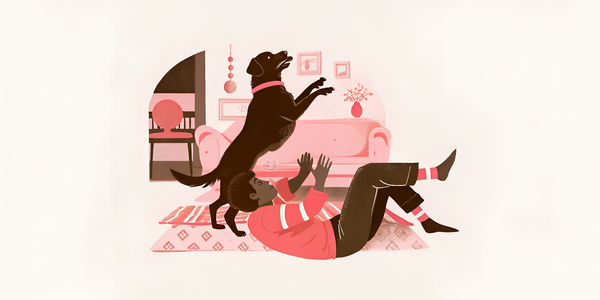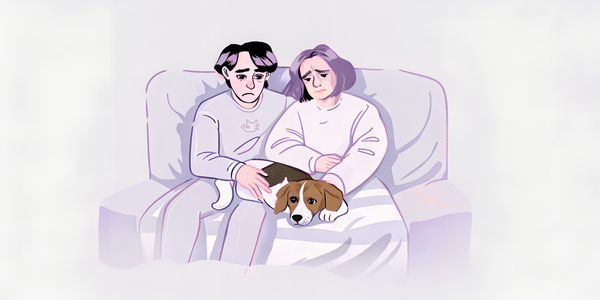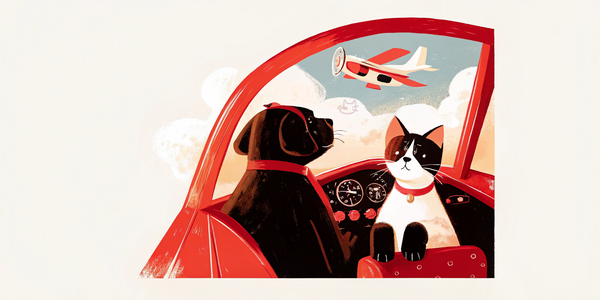Starting Pet Therapy at Home: A Practical Guide for Indian Families
Learn how to start pet therapy at home with simple techniques for Indian families. Manage stress, anxiety with your pet using budget-friendly activities and daily routines.

You don't need a certificate or special training to use pet therapy at home. Your regular pet - whether it's a dog, cat, or even a rabbit - can help manage stress, anxiety, and low moods. Indian families are discovering that the pets already in their homes are powerful allies for mental wellness.
Starting pet therapy at home is simple, costs nothing extra, and works with Indian family dynamics. Whether you live in a joint family in Delhi or a studio apartment in Mumbai, these techniques adapt to your situation. As we discussed in our complete guide to therapy pets, any pet can provide therapeutic benefits.

Understanding Home-Based Pet Therapy
Pet therapy at home is not about making your pet do special tricks. It's about intentionally using your pet's natural behaviors to improve your mental health. When your dog rests his head on your lap or your cat purrs on your chest, that's therapy happening naturally.
Research from UCLA Health proves that just 10-15 minutes of pet interaction can lower cortisol (stress hormone) levels. You don't need hour-long sessions - short, regular interactions throughout the day work better for busy Indian lifestyles.
Morning Routines That Set the Right Tone
How you start your day matters. Before reaching for your phone or rushing to make breakfast, spend 5-10 minutes with your pet.
For Dog Owners:
- Let your dog greet you properly - those excited tail wags boost your oxytocin
- Gentle morning pets while having chai create a calm start
- A short walk, even just around your building, clears both your minds
For Cat Owners:
- Let your cat's purring be your morning meditation
- Gentle brushing creates bonding time
- Play with a string toy to start the day with laughter
For Small Pet Owners:
- Watch your rabbit or hamster eat breakfast - their contentment is contagious
- Clean their space mindfully, focusing on caring for another being
- Talk to them - they're excellent listeners
This morning connection takes less time than scrolling through WhatsApp but gives much better returns for your mental health.
Dealing with Work Stress - The 5-Minute Reset
Working from home? In a high-stress job? Your pet can help. Indian professionals are finding creative ways to integrate pet therapy into workdays.
The Lunch Break Reset: Instead of eating at your desk, sit on the floor with your pet. In India, we're comfortable sitting on the ground - use this for bonding time. Share a few bites (pet-safe food only), talk about your morning, let them remind you there's life beyond spreadsheets.
The Meeting Break: After stressful calls, spend 5 minutes playing with your pet. Indoor exercise games work perfectly in small spaces. Throwing a ball down your hallway or playing hide-and-seek with treats shifts your mental state quickly.
Evening Transition: Create a ritual when work ends. Change clothes, then spend 10 minutes just being present with your pet. No phone, no TV. This boundary helps your brain switch from work mode to home mode.
Thanks for reading Nuzzy Club! Subscribe for free to receive new posts and support my work.
Managing Anxiety and Panic Attacks
Pets sense anxiety often before we fully realize it's happening. Use this to your advantage.
Grounding Technique with Pets: When anxiety rises:
- Find your pet and sit with them
- Focus on 5 things: their fur texture, breathing rhythm, warmth, smell, and any sounds they make
- Match your breathing to theirs - pets naturally breathe slower
- Pet them rhythmically - the repetitive motion calms your nervous system
Creating Safe Spaces: Designate a corner where you and your pet can retreat during overwhelming times. Add a cushion, maybe a blanket. When anxiety hits, go there together. Your pet learns this is the calm-down space and will often lead you there when they sense your distress.
Family Therapy Sessions
Indian families can use pets to improve overall family mental health. This works especially well in joint families where stress levels can run high.
Evening Family Time: Instead of everyone on phones, spend 15 minutes playing with pets together. Children learn empathy, elderly family members get movement and joy, and adults decompress from the day.
Responsibility Sharing: Rotate pet care duties. When Dadiji feeds the dog on Tuesday, she feels needed and purposeful. When children clean the cat's litter, they learn responsibility. This shared care creates family bonding.
Conflict Resolution: Pets don't take sides in family arguments. Use them as neutral ground. Can't agree on something? Take the dog for a walk together. The physical movement and shared focus often dissolves tension.
Budget-Friendly Therapy Activities
You don't need expensive toys or equipment. Indian jugaad works perfectly for pet therapy:
DIY Sensory Activities:
- Old dupatta becomes a tug toy
- Cardboard boxes become cat playgrounds
- Empty plastic bottles (supervised) make great puzzle feeders
- Kitchen vegetables like carrots work as healthy chew toys
Free Activities:
- Teaching new tricks using roti pieces as treats
- Grooming sessions with regular combs
- Making obstacle courses from furniture
- Hide-and-seek games using their favorite treats
Monsoon Activities: When you can't go outside during rains, try:
- Stair climbing exercises (if you have them)
- Dancing together to Bollywood music
- Teaching names of family members
- Creating treasure hunts indoors
Addressing Indian-Specific Challenges
Festival Stress: Diwali crackers, Holi colors, loud celebrations - festivals stress pets and owners. Create a quiet room, use pet therapy to calm each other. Play soft bhajans, sit together, make festivals peaceful bonding time.
Summer Heat: When it's too hot for walks, do therapy activities in early morning or late evening. Cooling mats, frozen treats, and gentle brushing help both of you stay calm despite the heat.
Small Spaces: Most Indians don't have large homes. Use vertical space - cat shelves, hanging toys. For dogs, mental exercise through training replaces some physical exercise needs.
Neighbor Concerns: If neighbors complain, invite them to see how well-behaved your pet is. Sometimes, letting Uncle next door give treats to your dog converts the biggest critics into supporters.
Pet therapy at home helps enormously, but it's not a replacement for professional help when needed. See a mental health professional if:
- Suicidal thoughts occur
- Anxiety prevents normal daily activities
- Depression lasts more than two weeks
- Substance abuse is involved
Your pet can support professional treatment. Many Indian therapists now encourage pet therapy alongside counseling.
Keep a simple diary. Note your mood before and after pet time. Many Indians using pet therapy report:
- Better sleep within a week
- Reduced anxiety within two weeks
- Improved family relationships within a month
- Overall better mood within six weeks
Studies show that consistent pet interaction provides cumulative benefits. The more regular your practice, the better your results.
You don't need to wait or prepare extensively. Your pet is ready to help right now. Whether you have a pedigreed dog or an adopted Indian street cat, they have the same capacity to heal and comfort.
Pet therapy at home costs nothing but gives everything - reduced stress, better family bonds, improved mental health, and a deeper connection with your furry family member. In a country where mental health support remains limited and expensive, our pets offer accessible, affordable, and effective therapy.
Start small. Try one technique today. Your pet has been waiting to help - all you need to do is let them.




